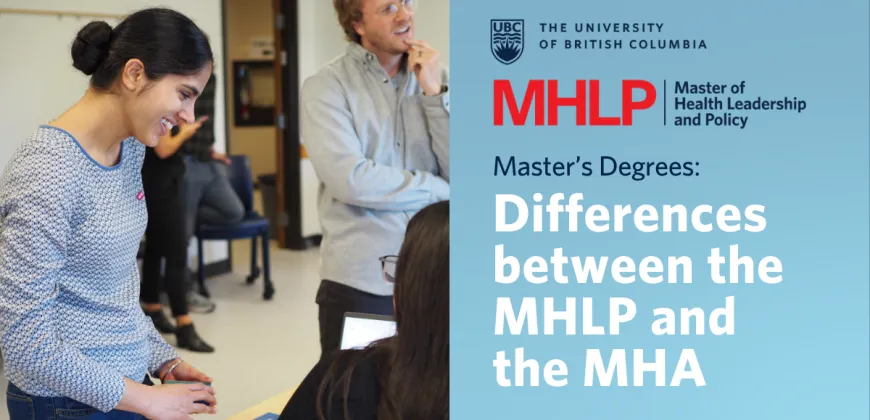Learning how to lead

Learning how to be a leader is a lifelong journey
As with any journey, you’re more likely to reach your goals if you are equipped for the challenges along the way.
Investing in your future through a graduate degree is one way to strengthen and practice your leadership skills. interdisciplinary degrees like the Master of Engineering Leadership or Master of Health Leadership and Policy offer unique opportunities for professionals who are ready to advance to the next stage of their career.
Depending on the program, between 30 and 50 per cent of the curriculum focuses explicitly on business and leadership. All MEL and MHLP students take three core business classes taught through UBC Sauder’s Robert H. Lee Graduate School (organizational leadership, business acumen for technical leaders and leadership & sustainability) as well as an additional 1.5-credit elective course of their choosing. Individual programs may require students to complete other business and leadership classes, such as project management & leadership and analytics & interpretation for applied sciences.
Thinking explicitly about leadership styles and structures
All students in the MEL and MHLP take a course on organizational leadership in the first semester of the program. For many alumni, this class provides a touchstone that guides them through the year and into their work life after graduation.
“Through case studies and discussions, we talk about what it means to be part of a team, as well as the qualities of being an effective manager and respected leader,” says Amy Stanley, an adjunct professor in Sauder’s organizational behaviour and human resources division who taught the class in 2021.
“I think the course really resonates with students because we have all been part of teams, both good and bad, and we have all had managers with differing skills and strengths. This class helps students see how all the pieces fit together, including stakeholders that are external to the organization.” She says the course is valuable because it brings an explicit focus to relationship dynamics and power structures that all working professionals will have experienced, and it encourages students to think about these issues and relationships in a more systematic and thoughtful way.
This was the experience of Chris Moore, who graduated from the MEL in High Performance Buildings in 2020. “When you come to this class after working for a company for many years, and then learn about how organizations operate, there are all these meaningful backward connections you can make where you suddenly understand how all these themes played out.”
Building emotional intelligence
Amy Stanley points to emotional intelligence as being a key attribute of a good leader – someone who has empathy for others, strong social skills and who is aware of their own emotional responses to situations (and able to manage those responses).
She believes that people can develop their emotional intelligence through a process of self-reflection. Assignments and discussions within the organizational leadership class – as well as the other business and leadership courses – support students in flexing their skills in this area. Namratha Rao, a 2020 graduate of the MEL in Dependable Software Systems, affirms that the business courses helped her bring more awareness to her interactions with others.
“These classes increased my level of self-awareness, teaching me how to recognize my limits and helping me build on my strengths in critical decision-making.”
Valuing diversity
Today’s leaders need to be comfortable with diversity and inclusion, and able to respect and incorporate difference within teams. The structure of the individual classes and the overall MEL and MHLP programs emphasize the value of diverse perspectives in solving complex programs.
Students from both the MEL and MHLP come together for the business and leadership classes, which create a rich, multidisciplinary learning environment made up of health-care professionals, engineers and urban planners.
The cohort is also diverse in terms of nationalities, with students coming to UBC from dozens of countries and with work experience from across the globe. Group projects reflect contemporary work environments, where multidisciplinary teams are the norm for large and complex projects. Students quickly gain skills in learning how to respect different perspectives and work effectively within groups whose members have very diverse backgrounds.
“Learning alongside those outside of a clinical background taught me the value of interdisciplinary teamwork and what’s required to build teams with diverse expertise,” says Yenlinh Chung, who graduated from the MHLP in Clinical Education in 2020.
“It’s made me much more confident about working in groups with others who have more of an administrative or financial perspective and ensuring they understand and value my clinical perspective and contributions.”
Developing your leadership potential
Becoming a better and more effective leader requires an active process of self-reflection and experimentation.
The business and leadership classes that make up one-third to one-half of the MEL and MHLP curricula enable students to think more systematically and thoughtfully about leadership issues, and the programs’ case studies, assignments and group projects create opportunities for students to practice a range of communication and leadership styles.
Ongoing professional development sessions offered throughout the year also create opportunities for students to grow as leaders.
Combined with the sector-specific courses offered through the Faculty of Applied Science where students develop the technical and domain expertise that is so essential to leadership, the MEL and MHLP equip professionals with the integrated skills needed to move with confidence into positions of significant responsibility.





